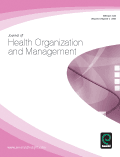
Journal of Health Organization and Management
Scope & Guideline
Navigating complexities in health organizations for a better tomorrow.
Introduction
Aims and Scopes
- Healthcare Management and Leadership:
The journal emphasizes the importance of effective leadership and management practices in healthcare settings, exploring how these factors influence organizational performance and employee satisfaction. - Patient Safety and Quality of Care:
A core focus is on improving patient safety and care quality through research on organizational culture, safety practices, and patient engagement strategies. - Digital Health and Technology Integration:
The journal addresses the integration of digital technologies in healthcare, including the adoption of AI, telemedicine, and electronic health records, with a focus on their impact on healthcare delivery. - Interprofessional Collaboration and Teamwork:
Research on enhancing collaboration among healthcare professionals is a key area, particularly how teamwork can improve patient outcomes and organizational efficiency. - Policy and Healthcare Systems:
The journal examines health policies and their implications for healthcare systems, including issues related to access, equity, and the impact of governance on health services. - Organizational Learning and Change Management:
It explores frameworks for organizational learning and change management, focusing on how healthcare organizations can adapt to changing environments and improve their service delivery.
Trending and Emerging
- AI and Digital Transformation in Healthcare:
There is a significant increase in research exploring the integration of AI technologies and digital tools in healthcare, focusing on their implications for management, patient care, and operational efficiency. - Sustainable Healthcare Practices:
Emerging studies emphasize sustainability in healthcare practices, including environmental impacts and the integration of sustainable business models within health organizations. - Employee Well-Being and Retention Strategies:
Recent publications highlight the importance of employee well-being, job satisfaction, and retention strategies, particularly in the wake of workforce challenges exacerbated by the COVID-19 pandemic. - Patient-Centered Care Models:
The shift towards patient-centered care continues to grow, with an emphasis on co-designing health services with patients and improving the overall patient experience. - Intersectoral Collaboration and Integration:
Research increasingly focuses on the importance of collaboration across sectors, especially in integrated care models that address complex health needs through coordinated efforts.
Declining or Waning
- Traditional Service Delivery Models:
There has been a noticeable reduction in research focused solely on traditional healthcare delivery models, as more studies now explore innovative and integrated care approaches. - Cost-Centric Approaches:
Papers that primarily focus on cost-cutting measures without considering quality improvements are less frequent, indicating a shift towards value-based care models that prioritize patient outcomes. - Single-Disciplinary Perspectives:
Research that examines healthcare issues from a single-disciplinary lens is declining, with a growing emphasis on interdisciplinary approaches that consider multiple perspectives and stakeholder inputs. - Workplace Bullying and Toxic Leadership:
While still relevant, studies specifically addressing workplace bullying and toxic leadership have decreased, possibly due to a broader focus on positive organizational culture and well-being. - Global Health Disparities:
Research specifically targeting global health disparities has waned, as the journal increasingly focuses on systemic issues within specific healthcare systems rather than broad international comparisons.
Similar Journals
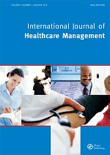
International Journal of Healthcare Management
Exploring the nexus of leadership and health policy.The International Journal of Healthcare Management, published by ROUTLEDGE JOURNALS, TAYLOR & FRANCIS LTD, stands as a crucial platform for the dissemination of innovative research and insights in the realm of healthcare management. With a focus on health policy, leadership, and management, this journal aims to bridge the gap between theory and practice, providing a valuable resource for researchers, professionals, and students alike. It boasts an impressive Q2 ranking in Leadership and Management and a Q3 ranking in Health Policy for 2023, highlighting its influence and relevance within the academic community. With an accessible ISSN of 2047-9700 and E-ISSN of 2047-9719, the journal features an array of peer-reviewed articles that promote the advancement of knowledge and best practices in healthcare settings. While currently not offered as open access, the journal publishes high-quality research that underscores the importance of effective management strategies in enhancing healthcare outcomes. Positioned in the United Kingdom, the journal continues to contribute significant knowledge and frameworks that guide healthcare leaders and policymakers in navigating the complexities of governance in health services.

Journal of Interprofessional Care
Exploring synergies in interprofessional care.The Journal of Interprofessional Care, published in the United Kingdom, is a premier scholarly outlet dedicated to advancing the field of interprofessional collaboration and healthcare delivery. With a notable impact factor signifying its relevance and influence, this journal holds a distinguished position in the Q1 category of Medicine, ranking #77 out of 636 in the broader field of General Medicine according to Scopus. Since its inaugural publication in 1986, it has served as a vital platform for researchers, practitioners, and students who seek to explore the synergies among various healthcare disciplines, ultimately aiming to improve patient outcomes and care integration. The journal’s rigorous peer-review process ensures high-quality contributions that enhance our understanding of collaborative practices in healthcare. Though currently not an open-access journal, it continues to provide a wealth of knowledge for those invested in interprofessional education and practice.
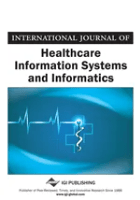
International Journal of Healthcare Information Systems and Informatics
Empowering research at the intersection of healthcare and informatics.International Journal of Healthcare Information Systems and Informatics is a prestigious academic journal published by IGI Global, focusing on the vital intersection of healthcare and information technology. With an ISSN of 1555-3396 and E-ISSN of 1555-340X, this journal serves as a pivotal platform for researchers, professionals, and students to explore innovative solutions and advancements in healthcare informatics. As of 2023, it holds a commendable Q3 ranking in categories such as Information Systems and Medicine, highlighting its significant contribution to the academic community. Covering a wide range of topics from healthcare data management to the implementation of information systems in clinical settings, the journal aims to foster critical discussions and disseminate impactful research. With a publication history spanning from 2006 to 2024, it continues to play a crucial role in guiding the future of healthcare information systems. Readers can access this journal through traditional subscription methods, ensuring that leading-edge research reaches those most invested in the evolution of healthcare informatics.
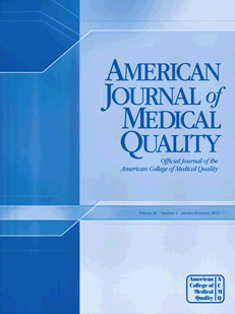
AMERICAN JOURNAL OF MEDICAL QUALITY
Pioneering Research for Quality Improvement in MedicineAmerican Journal of Medical Quality is a pivotal publication in the field of healthcare quality and medical policy, published by Lippincott Williams & Wilkins. Since its inception in 1992, the journal has become a critical resource for researchers, practitioners, and students dedicated to improving patient care and health systems through evidence-based practices. With a current impact factor that reflects its significance in the arena of medicine and health policy, the journal falls within the Q3 category in both Health Policy and Medicine (Miscellaneous) as of 2023, ranking 253rd out of 636 in general medicine according to Scopus metrics. This underscores its relevance and prominence among peers. The journal's scope encompasses a diverse range of topics related to quality improvement initiatives, healthcare delivery systems, and policy analysis, making it an essential read for anyone invested in advancing medical quality standards and practices. While it is not an open-access journal, the content is meticulously curated to enrich the academic discourse and inform best practices in medical quality. With an ongoing commitment to addressing contemporary challenges in healthcare, American Journal of Medical Quality serves as an influential platform for advancing the knowledge and implementation of quality initiatives in medical settings.
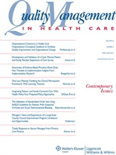
Quality Management in Health Care
Empowering healthcare professionals with innovative insights.Quality Management in Health Care is a revered peer-reviewed journal published by Lippincott Williams & Wilkins, dedicated to advancing the understanding and implementation of quality management principles within the healthcare sector. With an ISSN of 1063-8628 and E-ISSN 1550-5154, this journal has established its reputation through the dissemination of rigorous research and innovative practices that address critical issues in care planning, health policy, and leadership management. The journal is ranked in the Q3 quartile across multiple categories, including Care Planning and Health Policy, demonstrating its significance in the evolving landscape of health management. Although it does not currently offer Open Access options, its blend of theoretical and practical insights makes it an essential resource for researchers, healthcare professionals, and students keen on enhancing quality and effectiveness in health services. This journal continues to play a vital role in shaping best practices and fostering a culture of quality excellence in healthcare, aligning with its objective to refine organizational practices and improve patient outcomes.
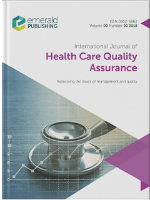
INTERNATIONAL JOURNAL OF HEALTH CARE QUALITY ASSURANCE
Exploring Best Practices for Quality ImprovementINTERNATIONAL JOURNAL OF HEALTH CARE QUALITY ASSURANCE is a leading academic journal published by Emerald Group Publishing Ltd, dedicated to advancing the fields of health care quality and health policy. Established in 1988, this esteemed journal addresses critical issues in health care management, offering insights into best practices and innovative strategies to enhance quality assurance in diverse health care settings. With an impact factor that places it in the Q3 tier across both health policy and business management categories, the journal serves as a valuable resource for researchers, practitioners, and students seeking to contribute to the conversation on health care quality improvement. Although currently not an Open Access journal, it remains accessible through various academic databases, facilitating a wide reach of its scholarly contributions. The journal's mission is to foster interdisciplinary dialogue and share evidence-based research that can inform policies and practices aimed at improving health care delivery globally.

Health Information Management Journal
Advancing Health Through Information ExcellenceHealth Information Management Journal, published by SAGE Publications Inc., is a premier academic resource dedicated to the intersection of health informatics, health information management, health policy, and leadership in health services. With an impressive track record since its inception in 2002, this journal steadily contributes to scholarly dialogue and innovation in the field, holding a commendable Q2 ranking in Health Informatics, Health Information Management, and Health Policy, and a distinguished Q1 ranking in Leadership and Management as of 2023. As a critical platform for researchers, professionals, and students, it fosters the dissemination of cutting-edge research and practical applications, bridging the gap between theory and practice. Though not an open-access journal, it provides a wealth of subscription-based resources that are invaluable for advancing knowledge and improving health systems globally. The journal’s commitment to high-quality, peer-reviewed content ensures that it remains a vital tool for anyone invested in the future of health information management.
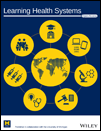
Learning Health Systems
Elevating health informatics for a healthier tomorrow.Learning Health Systems is a premier open access journal published by WILEY that has been at the forefront of innovation in the fields of Health Informatics, Health Information Management, and Public Health since its inception in 2016. With a dedicated focus on the intersection of clinical practice and health technology, this journal is pivotal for researchers, professionals, and students seeking to advance the knowledge base in these critical areas. The journal enjoys a robust reputation, boasting a Q1 ranking in multiple categories as of 2023, and ranking within the top percentiles in both Medicine and Health Professions across various metrics. Designed to foster collaboration and dissemination of cutting-edge research, Learning Health Systems is committed to bridging gaps between data science and practical health applications while providing an accessible platform for transformative ideas. It invites contributions that challenge existing paradigms and promote innovative solutions that enhance healthcare delivery and patient outcomes.

BMJ Leader
Elevating Healthcare Leadership through Insightful ResearchBMJ Leader, published by the esteemed BMJ PUBLISHING GROUP, is a vital resource for those engaged in the fields of Health Policy, Leadership and Management, and Strategy and Management. Since its inception in 2017 and spanning through 2024, this journal serves as a conduit for innovative research and practical insights that empower healthcare leaders and professionals to navigate complex challenges in modern healthcare systems. With an impressive standing in the Q2 and Q3 category quartiles and significant rankings within Scopus profiles for its relevant disciplines, BMJ Leader plays an essential role in shaping the discourse around effective leadership and strategy in health and management. Despite its open access status, the journal maintains a high impact factor, highlighting the relevance and quality of its content. As the landscape of healthcare continues to evolve, BMJ Leader remains committed to fostering collaboration and knowledge sharing among researchers, practitioners, and students alike, making it an indispensable addition to the academic community.

BMJ Open Quality
Advancing excellence in health policy and management.BMJ Open Quality, published by the esteemed BMJ Publishing Group, is an influential open access journal that has been a vital platform for advancing the quality of healthcare since its inception in 2017. Based in the United Kingdom, this journal focuses on a diverse range of topics within health policy, leadership and management, and public health, catering specifically to professionals, researchers, and students eager to explore the intersection of quality improvement and healthcare delivery. With an impressive ranking in Scopus categories, including Q2 in Health Policy and Leadership and Management, BMJ Open Quality fosters a multidisciplinary dialogue that addresses the pressing challenges facing the healthcare sector today. Researchers will find robust access options, allowing for unrestricted sharing of valuable findings, thereby enhancing collaboration and innovation in the field. Positioned at the forefront of quality enhancement methodologies, BMJ Open Quality is indispensable for those dedicated to driving systematic changes in health services.